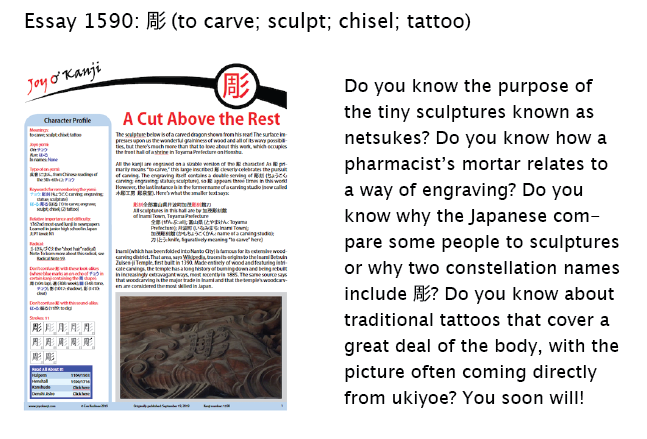Swallowing a Camera
In my most recent talk with a Japanese friend, two things felt charmingly clear. That doesn't usually happen with my conversations in Japanese!
I was tickled when he said this:
胃カメラを飲んだ。
Lit., I swallowed a stomach camera.
胃 (い: stomach); 飲む (のむ: to swallow)
As I've had my share of stomach troubles, I immediately knew what he meant: "I had an endoscopy." But if I didn't know about endoscopes (胃カメラ), I would have been quite puzzled about the idea of swallowing a Canon, Nikon, or the like. (Ah, it turns out Olympus made the first 胃カメラ in Japan and is still the top endoscope manufacturer.)
I sometimes think I study Japanese just to hear completely different perspectives on situations!
My friend also mentioned this word:
いびき (鼾: snoring; snore)
Although most people don't know or use the non-Joyo kanji 鼾, I had a great time considering the two parts, 鼻 (nose) + 干 (dry), and thinking about whether a dry nose really plays a part in snoring. If anything, I would think snoring would dry out the mouth! (As I've now learned, the etymology doesn't involve detailed information about bodily functions. Kanjigen simply says that 鼾 consists of 鼻 (nose) + the phonetic 干. Together these two halves onomatopoetically represent the snoring sound han. Incidentally, 鼻 includes the "letter H" radical 廾, whereas the bottom of 鼾 has a π shape. In fact, what you see on the left side of 鼾 is the old shape of the Joyo 鼻 kanji.)
As long as we're considering body parts, I'll share a sentence from a sign in the Gauguin Museum in Tahiti, a sentence that showcases 彫刻 (ちょうこく: carving; engraving; sculpture):
彼の画と彫刻は、植民地開拓者によって骨抜きにされた現地人の無表情の目と悲しい愛を示している。
His paintings and sculptures show the expressionless eyes and pained love of the locals with their spirits crushed by the colonists.
彼 (かれ: he); 画 (え: painting); 植民地 (しょくみんち: colony); 開拓者 (かいたくしゃ: settler; colonist); 骨抜きにする (ほねぬきにする: to ruin the important part); 現地人 (げんちじん: local people); 無表情 (むひょうじょう: lack of expression); 目 (め: eye); 悲しい (かなしい: unhappy, pained); 愛 (あい: love); 示す (しめす: to show)
I included this sentence in the new essay 1590 on 彫 (to carve; sculpt; chisel; tattoo) to draw attention to this use of 彫刻. But various discussions about this sentence have instead put the spotlight on 骨抜き.
One proofreader thought that word might mean "tooth extraction," which does make sense, as 骨 means "bone," and 抜く is "to pull out." In fact, I found a great article from 1934 to support this idea. The piece explained that the Tahitians and locals on neighboring islands were in excellent health and had terrific teeth until colonists arrived. Then the natives began subsisting largely on imported foods, and tooth decay became rampant. The islands had no native dentists or dentistry, so the colonists stepped in and extracted teeth. Coincidentally, the article mentioned that many of the natives were skilled woodcarvers. Everything was coming together beautifully!
Then another proofreader noted that this 骨抜き doesn’t literally mean “tooth extraction.” Rather, it figuratively means “to ruin the important, substantial part” of something. That is, the colonists were cruel and even violent toward the local people and broke their spirits.
Breen's definitions of 骨抜き make the etymology quite clear:
骨抜き (ほねぬき: (1) boning (fish or meat); deboning; (2) watering down (a plan, bill, etc.); dilution; emasculation; (3) taking the backbone out of; weakening)
bone + pulling out
When you pull the bone out of flesh, you weaken it. Wait! The animal is already dead. How much weaker can it be? Still, the image holds. The bone provides structure and therefore strength even to dead flesh.
The Japanese often use 骨抜き in the following phrase (as in the Gauguin sign):
骨抜きにする (to take the teeth (out of); eviscerate)
They frequently apply this expression to proposals, especially bills before a legislature:
原案は骨抜きにされた。
The original plan was watered down.
原案 (げんあん: original plan, original bill)
議案を骨抜きにする
to water down a bill; add crippling amendments to a bill
議案 (ぎあん: legislative bill)
骨抜きにされた法案
an eviscerated bill
法案 (ほうあん: bill)
These examples give us great exposure to 案 (proposal; idea; expectations)!
Here's one more sample sentence:
金をつかまされて骨抜きにされた。
I was bribed and gutted.
金 (かね: money)
The つかまされて is the product of quite a transformation. The original verb is 掴む (つかむ: to grasp). Its causative form is 掴ませる or 掴ます (to make someone grasp); we see the latter option here. In its passive voice, that becomes 掴まされる (to be forced to grasp). And then 掴まされて is the -て form of that. It's probably better to take 金を掴まされる (lit. “to be forced to grasp money”) as a whole, as this idiomatic phrase means “to be bribed.”
As for the reddened word, that conveys that the speaker's spirit has been crushed.
Well, I hope you're full of spirit and ready for essay 1590 because it shines a light on several parts of Japanese culture of which I knew nothing. Here's a sneak preview:
Catch you back here next time!
❖❖❖
Did you like this post? Express your love by supporting Joy o' Kanji on Patreon:



Comments